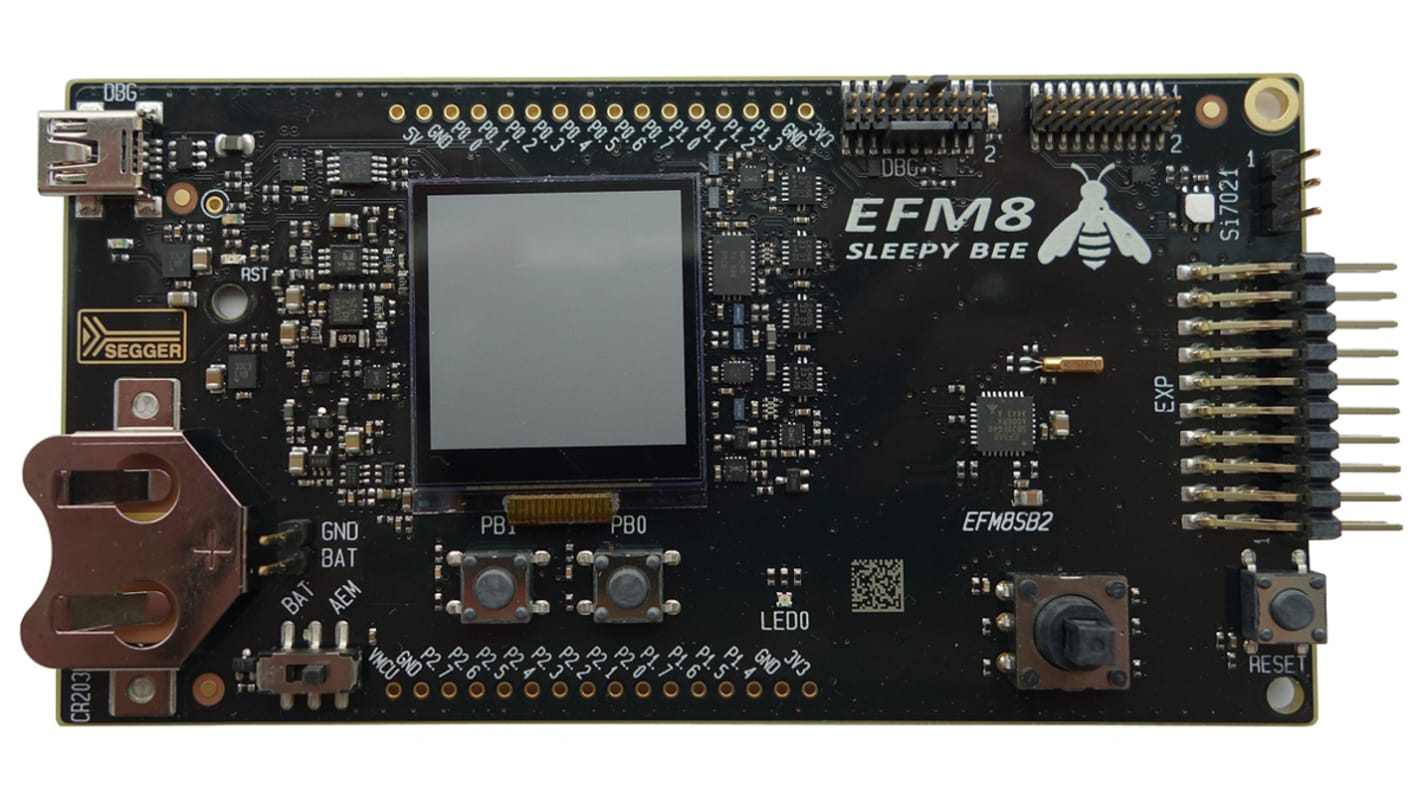Silicon Labs EFM8SB2 Sleepy Bee MCU Starter Kit SLSTK2011A
- RS Stock No.:
- 865-2384
- Mfr. Part No.:
- SLSTK2011A
- Brand:
- Silicon Labs

Currently unavailable
We don't know if this item will be back in stock, RS intend to remove it from our range soon.
- RS Stock No.:
- 865-2384
- Mfr. Part No.:
- SLSTK2011A
- Brand:
- Silicon Labs
Specifications
Technical Reference
Legislation and Compliance
Product Details
Find similar products by selecting one or more attributes.
Select all | Attribute | Value |
|---|---|---|
| Brand | Silicon Labs | |
| Kit Classification | Starter Kit | |
| Product Type | Starter Kit | |
| Kit Name | EFM8SB2 Sleepy Bee | |
| Technology | MCU | |
| Device Core | EFM8SB20F64G MCU | |
| Processor Family Name | M12 | |
| Processor Part Number | EFM8SB20F64G | |
| Processor Type | MCU | |
| Standards/Approvals | RoHS | |
| Select all | ||
|---|---|---|
Brand Silicon Labs | ||
Kit Classification Starter Kit | ||
Product Type Starter Kit | ||
Kit Name EFM8SB2 Sleepy Bee | ||
Technology MCU | ||
Device Core EFM8SB20F64G MCU | ||
Processor Family Name M12 | ||
Processor Part Number EFM8SB20F64G | ||
Processor Type MCU | ||
Standards/Approvals RoHS | ||
EFM8 Sleepy Bee Starter Kits
Two starter kits for evaluation of the very low-power 8-bit EFM8 Sleepy Bee microcontrollers. EFM8 Sleepy Bee microcontrollers offer very low power consumption by combining innovative low-energy techniques with short wakeup times and include up to 14 high-quality capacitive touch sense channels.
SLSTK2010A: 25MHz EFM8SB10F8G-A 8051-core microcontroller, 8KB Flash memory, 512B RAM (RS 865-2375)
SLSTK2011A: 25MHz EFM8SB20F64G-A 8051-core microcontroller, 64KB Flash memory, 4532B RAM (RS 865-2384)
Integrated debugger
Advanced Energy Monitor (AEM)
Si7021 humidity and temperature sensor on I2C bus
128 x 128 pixel memory LCD display, reflective monochrome
2 x user pushbuttons
Reset pushbutton
Thumb analogue joystick
Capacitive touch pads
Access to GPIO via breakout pads
32kHz crystal for Real Time Clock (RTC) operation
User LED (tri-colour for SLSTK2011A, single-colour for SLSTK2010A)
Powered from USB connector or CR2032 coin cell, selected by slide-switch
CR2032 coin cell holder
miniUSB power connector
20-pin Expansion header & Debug connectors
The EFM8 8-bit microcontroller family has an unparalleled combination of features and capabilities including a high-speed pipelined 8051 core, ultra-low power, precision analogue and enhanced communication peripherals, integrated oscillators, small-footprint packages, and a crossbar architecture that enables flexible digital and analogue multiplexing to simplify PCB design and I/O signal routing. These next-generation 8-bit devices are aimed at the engineer developing products for the Internet-of-Things (IoT) which will be very small, perform complex processing and run off tiny batteries.
Supplied with
CR2032 battery, getting started card and USB cable.
Related links
- Silicon Labs EFM8SB1 Sleepy Bee MCU Starter Kit SLSTK2010A
- Silicon Labs EFM8™ Busy Bee Low Cost 8-bit MCU Starter Kit Starter Kit EFM8BB1LCK
- Silicon Labs ToolStick University MCU Starter Kit TOOLSTICKUNISK
- Silicon Labs EFM32 Pearl Gecko MCU Starter Kit SLSTK3401A
- Silicon Labs EFM12PG12 Pearl Gecko MCU RF MCU Starter Kit SLSTK3402A
- Microchip PIC32MX1/2/5 MCU Starter Kit DM320100
- Renesas Electronics MCU Starter Kit YR0K5010WMS000BE
- Microchip 16-BIT 28P DEMO BOARD MCU Starter Kit DM300027
